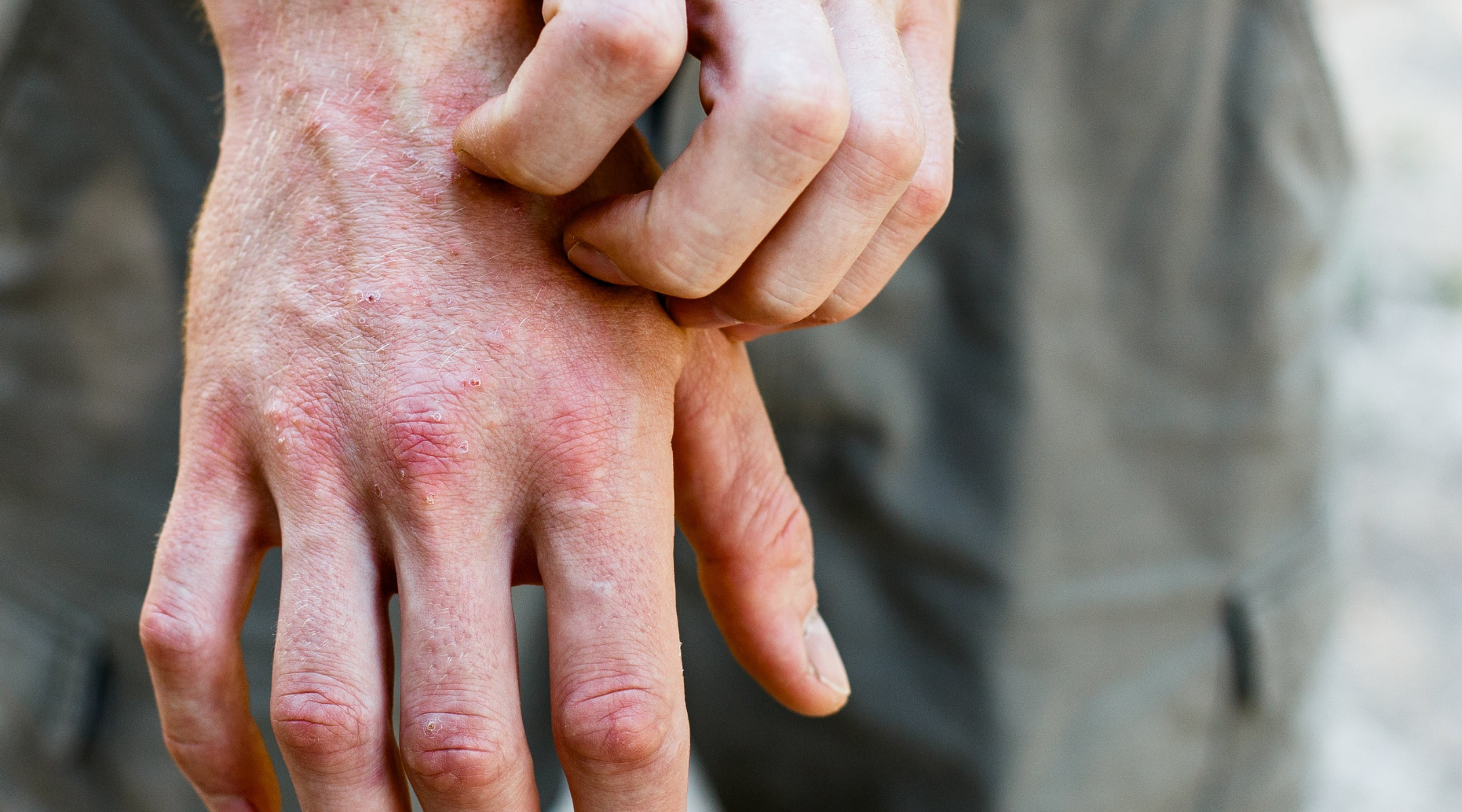Living with a skin condition can be a challenging experience, particularly when flare-ups occur. These episodes of intense itching, inflammation and discomfort can significantly impact one's quality of life. In this blog, we will explore the various triggers of eczema flare-ups and provide valuable tips and insights on how to manage them.
Understanding Eczema Flare-ups
Eczema flare-ups can be triggered by a variety of factors, such as environmental allergens, stress, dry skin, irritants and certain foods. It's crucial to identify your triggers to better manage and prevent flare-ups. Here are some common triggers and how to address them:
-
Environmental Allergens: Allergens like pollen, dust mites, pet dander or mold can worsen symptoms. Minimise exposure to these allergens by regularly cleaning your living spaces, using allergen-proof bedding and maintaining proper ventilation.
-
Irritants: Certain irritants, such as harsh soaps, detergents, fragrances or chemicals in skincare products, can trigger flare-ups. Opt for gentle, fragrance-free products and avoid contact with irritants as much as possible.
-
Dry Skin: Dry skin is a common precursor to eczema flare-ups. When the skin is dry, it becomes more susceptible to irritation and inflammation. Keep your skin well-hydrated by regularly moisturising after bathing using an intensive moisturiser such as the Grahams Natural C+Cream Eczema & Dermatitis Cream.
-
Stress: Stress is known to worsen symptoms. When you're under stress, your immune system can become compromised, leading to increased inflammation. Practice stress management techniques such as deep breathing exercises, meditation or engaging in activities that promote relaxation.
-
Climate and Weather Changes: Extreme temperatures, low humidity or exposure to cold, dry air can trigger eczema flares. Protect your skin by dressing appropriately for the weather and using humidifiers to add moisture to the air in dry environments.
-
Sweating: Excessive sweating, particularly in hot and humid conditions, can exacerbate symptoms. After sweating, it's important to gently cleanse your skin to remove sweat and bacteria, followed by moisturising to prevent dryness.
-
Food Allergens: Certain foods can act as triggers for eczema flare-ups in some individuals. Common culprits include dairy products, eggs, nuts, soy, gluten and citrus fruits. If you suspect a particular food triggers your eczema, consider keeping a food diary to identify patterns and consult with a healthcare professional for guidance.
-
Hormonal Changes: Fluctuations in hormone levels, particularly in women, can influence eczema symptoms. Hormonal changes during puberty, pregnancy, or menopause can lead to increased skin sensitivity and flare-ups. It's important to be mindful of these changes and adjust your skincare routine accordingly.
By being aware of these triggers, you can take proactive steps to avoid or minimise exposure to them. Additionally, incorporating suitable skincare products like those offered by Graham's Natural can help soothe and protect your skin, reducing the risk of flare-ups. Remember, each individual's triggers may vary, so it's important to pay attention to your body's responses and consult with a healthcare professional for personalised advice.
Common Eczema Symptoms
Recognising symptoms can help you identify and manage eczema flare-ups. Here are the most frequently observed eczema symptoms:
-
Redness and Inflammation: Eczema often presents as patches of red, inflamed skin. The affected areas may appear swollen and feel warm to the touch. This redness and inflammation are signs of the body's immune response and increased blood flow to the affected skin.
-
Intense Itching: One of the hallmark symptoms of eczema is intense itching. The affected skin may feel extremely itchy, leading to a strong urge to scratch. Unfortunately, scratching can further aggravate the skin and trigger a vicious itch-scratch cycle.
-
Dry and Flaky Skin: Eczema-prone skin tends to be dry, rough, and scaly. It lacks the natural oils that help retain moisture, making it more susceptible to dryness and irritation. This dryness can cause the skin to become tight and prone to cracking or flaking.
-
Skin Lesions: In more severe cases of eczema, skin lesions may develop. These can include blisters, weeping sores, or crusty patches on the skin. These lesions occur as a result of prolonged scratching, which damages the skin's protective barrier.
-
Oozing and Crusting: Eczema can cause the skin to ooze and develop a crusty appearance. This typically occurs when the skin becomes so inflamed and irritated that it starts to weep or leak fluid. The fluid then dries and forms crusts on the skin's surface.
-
Skin Discoloration: Over time, chronic eczema can lead to changes in skin pigmentation. The affected areas may become darker or lighter than the surrounding skin. These pigmentary changes can be temporary or permanent, depending on the severity and duration of the eczema.
-
Skin Thickening: With repeated inflammation and scratching, the affected skin may thicken over time. This thickening, known as lichenification, is the skin's response to chronic irritation. It may feel rough and have a leathery texture.
It's important to note that eczema symptoms can vary in severity and may come and go in cycles. Some individuals may experience eczema symptoms, while others may have more severe and persistent flare-ups. Monitoring your symptoms and seeking appropriate treatment can help manage and alleviate these discomforts.
Remember, if you experience any concerning or worsening symptoms, it's recommended to consult with a dermatologist or healthcare professional for an accurate diagnosis and personalised treatment plan.
Lifestyle Changes to Manage Eczema Flares
In addition to identifying and avoiding triggers, certain lifestyle changes can significantly help manage and reduce the frequency of flare-ups. By incorporating the following practices into your daily routine, you can support your skin's health and minimise the impact:
-
Moisturise Regularly: Keeping your skin well-hydrated is crucial for skin management. The Graham's Natural C+Cream is a rich cream that helps replenish and retain moisture in the skin. For an added layer of hydration, prior to applying the C+Cream, use Graham's Natural Body & Bath Oil. This oil creates a protective barrier on the skin, sealing in moisture and preventing water loss. Apply the oil & cream at least twice a day, especially after bathing or washing your hands. Moisturisers help lock in moisture, soothe dryness and strengthen the skin's natural barrier function. If you find you are struggling with hot, inflamed mild eczema, try the Grahams Natural Eczema Gel. The Eczema Gel combines a range of naturally hydrating ingredients to soothe and calm inflammation, whilst hydrating dryness and reducing irritation. Alternatively, if you are struggling with sensitive, itchy, red or dry skin on the more sensitive parts of your body & and face then the Grahams Natural Face & Eyelid Eczema Cream is the perfect addition to your routine!
-
Avoid Hot Water: Hot water can strip the skin of its natural oils, leading to dryness and irritation. When bathing or showering, use lukewarm water instead of hot water. Additionally, limit your bathing time to 10-15 minutes to prevent excessive drying of the skin.
-
Pat Dry, Don't Rub: After bathing or washing, gently pat your skin dry with a soft towel instead of rubbing, which can cause further irritation and worsen eczema symptoms. Leave a bit of moisture on the skin and apply the your Graham's Natural products while the skin is still slightly damp to lock in hydration.
-
Choose Gentle Cleansers: Harsh soaps and cleansers can further irritate sensitive skin. Opt for gentle, fragrance-free cleansers like Graham's Natural Intensive Therapy Body Wash. This body wash effectively cleanses without stripping away the skin's natural oils, reducing the risk of irritation and flare-ups.
-
Clothing Choices: The fabrics you wear can impact your eczema. Choose soft, breathable fabrics like cotton and avoid rough or scratchy materials that can cause friction and irritation. Additionally, wash new clothes before wearing them to remove any potential irritants or chemicals.
-
Manage Stress: Stress is known to trigger and exacerbate eczema symptoms. Find healthy ways to manage and reduce stress in your life. This may include engaging in activities you enjoy, practicing relaxation techniques like deep breathing exercises or meditation, or seeking support from friends, family, or support groups.
-
Maintain a Healthy Lifestyle: Overall wellness plays a significant role in managing eczema. Make sure to prioritise sleep, exercise regularly and maintain a balanced diet. Adequate sleep helps the body repair and rejuvenate the skin, while regular exercise can reduce stress levels and improve overall well-being. A balanced diet rich in fruits, vegetables, lean proteins, and healthy fats provides essential nutrients for skin health.
-
Environmental Considerations: Creating a skin-friendly environment can help manage eczema flares. Use humidifiers to add moisture to the air, particularly during dry seasons or in climates with low humidity. Be cautious of indoor heating systems that can dry out the air and worsen eczema symptoms. Consider using natural, fragrance-free cleaning products and avoid exposure to harsh chemicals.
-
Limit Scratching: Eczema can cause intense itching, leading to a vicious cycle of scratching and worsening symptoms. Keep your nails short and clean to minimise skin damage from scratching. If needed, consider using gloves or applying a cold compress to the itchy areas to alleviate the urge to scratch.
By incorporating these lifestyle changes into your daily routine, you can create an environment that supports healthy skin and minimises the occurrence of eczema flares. Remember, everyone's eczema is unique, so it's essential to listen to your body, pay attention to what works best for you, and consult with a healthcare professional for personalised advice and guidance.
Diet and Nutrition for Eczema
While the relationship between diet and eczema varies among individuals, making certain dietary adjustments may help manage and reduce the severity of eczema symptoms. It's important to note that these dietary recommendations are not universal and may not apply to everyone. However, exploring the potential impact of diet on your eczema can be a worthwhile endeavor. Here are some considerations for diet and nutrition when managing eczema:
-
Identify Food Triggers: Keep a food diary to track any potential connections between your diet and eczema flare-ups. Common trigger foods include dairy products, eggs, gluten, soy, nuts, and certain fruits or vegetables. If you notice a pattern, consider eliminating or reducing the consumption of these trigger foods.
-
Anti-Inflammatory Foods: Incorporate foods that have anti-inflammatory properties into your diet. These foods can help reduce inflammation and alleviate eczema symptoms. Examples include fatty fish (salmon, mackerel, sardines), which are rich in omega-3 fatty acids, as well as flaxseeds, chia seeds, walnuts, and hemp seeds.
-
Omega-3 Fatty Acids: Omega-3 fatty acids play a vital role in reducing inflammation in the body. They can be found in fatty fish, as mentioned above, but if you're looking for an internal oil rich in omega-3s, consider Graham's Natural Mega Oil. This supreme blend of omega 3, 6 & 9's provides a convenient way to supplement your diet with omega-3s, promoting skin health from the inside out.
-
Antioxidant-Rich Foods: Antioxidants help protect the body from oxidative stress and promote overall skin health. Include plenty of fruits and vegetables in your diet, particularly those rich in antioxidants, such as berries (blueberries, strawberries, raspberries), leafy greens, tomatoes, and colorful fruits like oranges and kiwis.
-
Hydration: Stay hydrated by drinking an adequate amount of water throughout the day. Hydrated skin is less prone to dryness and can help alleviate eczema symptoms.
While incorporating these dietary recommendations can be beneficial, it's essential to remember that individual responses may vary. What works for one person may not work for another. If you're considering significant dietary changes or have specific concerns, it's advisable to consult with a healthcare professional or a registered dietitian who specialises in eczema and nutrition.
Coping with Eczema Flare-ups Emotionally
Living with eczema can have a significant emotional impact. The constant itchiness, discomfort and visible skin changes can affect self-esteem and overall well-being. Here are a few strategies to help you cope with eczema emotionally:
-
Seek Support: Reach out to friends, family, or support groups who understand your experience with eczema. Sharing your thoughts and feelings with others who can relate can provide comfort and reassurance.
-
Educate Yourself: Learn more about eczema to better understand its nature and how it affects you. Knowledge empowers you to make informed decisions about managing your condition and can reduce anxiety and frustration.
-
Practice Self-Care: Engage in activities that promote self-care and relaxation. This can include taking warm baths, practicing mindfulness or meditation, listening to calming music or engaging in hobbies that bring you joy and help take your mind off the symptoms.
-
Manage Stress: Stress can worsen eczema symptoms, so it's important to find healthy ways to manage stress levels. Consider incorporating stress-reducing activities into your routine.
-
Communicate with Healthcare Professionals: Maintain open and honest communication with your healthcare professionals. They can provide guidance, offer treatment options and address any concerns or questions you may have about managing eczema.
-
Protect Your Mental Health: It's essential to prioritise your mental well-being. If you find that eczema is significantly impacting your mental health, consider seeking professional support from a therapist or counselor who can help you develop coping strategies and provide emotional support.
Remember, coping with eczema emotionally is a personal journey, and it's important to find strategies that work best for you. Don't hesitate to reach out for support when needed, and remember that you are not alone in this experience.





